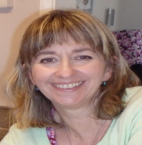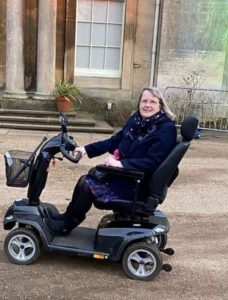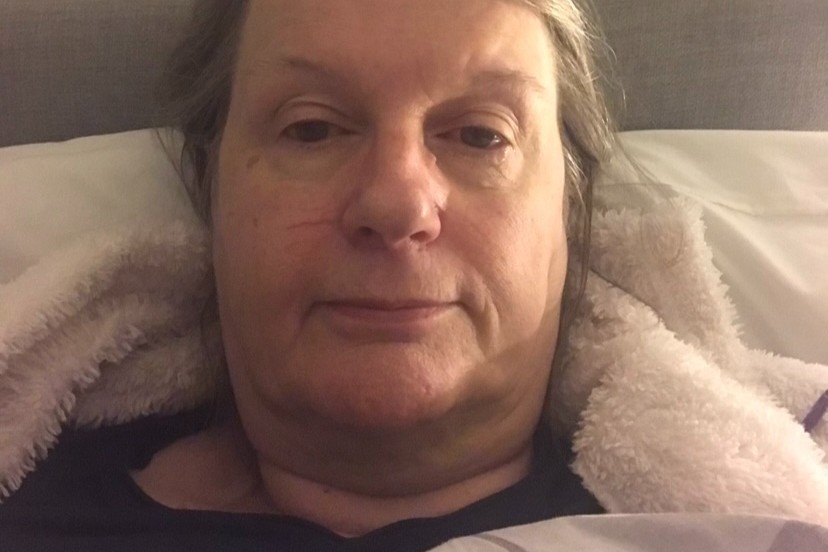Long-term conditions have historically been a core domain for nurses but there is one such chronic illness in which they currently have little involvement in management and care.
Myalgic encephalomyelitis (ME), also known as chronic fatigue syndrome (CFS), is a complex and debilitating condition that affects people in a multitude of different ways and reduces their mobility and energy levels.
While some passionate nurses are already working in – and leading – ME/CFS services, they are few and far between, with care mostly delivered by occupational therapists (OTs), doctors, psychologists and dietitians.
The same is true of care for long Covid – a condition that emerged during the pandemic and is increasingly being treated alongside ME/CFS due to their similarities.
However, with ME/CFS and long Covid patients all facing a postcode lottery in access to diagnosis, support and care, and the prevalence of these conditions rising, some people are advocating for nurses to have a greater role.
One proposal is for a new national network of nurses to be introduced for this group of patients, similar to those in place for a range of other conditions, such as cancer and dementia.
Anna Gregorowski, a consultant nurse in ME/CFS since 2004 and chair of the British Association of Clinicians in ME/CFS (BACME), thought that such a network of nurses was an “excellent idea”.
She said the nursing role worked well in these services because of nurses’ ability to work autonomously and part of a team, their focus on holistic and individualised care and their skills in communication and being an advocate for their patients.
At her trust, University College London Hospitals NHS Foundation Trust, Ms Gregorowski is the clinical lead for the service for adolescents with complex conditions, which includes ME/CFS.
She said she was aware of other nurses, like herself, who were not just working in ME/CFS services but leading them.
However, she said, nationally, there were still “very few” nurses in this specialty.
BACME’s nurses’ group only has around a dozen members, and a survey carried out by the organisation in 2023 showed that only 11 services that responded employed a nurse.
What is ME/CFS?
ME/CFS is a long-term condition that can affect different parts of the body.
While the cause of the condition is not fully understood, it seems to usually develop after a viral or bacterial infection.
However, the onset of symptoms also sometimes follows a traumatic or stressful event in a person’s life, or a long period of stress.
The condition can cause a wide range of symptoms including fatigue, sleep problems, brain fog, headaches, muscle aches, dizziness, nausea and digestive problems.
Any physical or mental exertion – no matter how minor – can result in a flare-up of symptoms.
In extreme cases, people may be unable to leave their bed and find it difficult to speak, eat and drink.
There is no specific test to diagnose ME/CFS and no cure or effective drug treatments.
Although full recovery is rare, symptoms can stabilise and improve over time with the right support and management.
One of the issues was the lack of a “clear pathway” for nurses to move into the field, Ms Gregorowski said.
She felt that landmark changes in 2021 to the National Institute for Health and Care Excellence’s (NICE) guideline for ME/CFS could pave the way for more nurses to come into these services and wanted to see this happen.
“The guideline has shifted a lot, and I would say there’s even more scope for nurses to be involved in ME/CFS care and support,” she said.
As well as more nurse specialists, she called for ME/CFS to be added to the curriculum for all student nurses and other health professionals to improve knowledge of the condition in the workforce at large.

Anna Gregorowski
Gaps in provision for people with ME/CFS have been brought into the spotlight recently by the case of Maeve Boothby-O’Neill, a 27-year-old woman who died at home in 2021 after three admissions to hospital were unable to treat the consequences of her severe ME which included malnutrition.
The coroner in her inquest issued a prevention of future deaths report last month, warning that, without action to improve the availability of specialist services among other changes, there was a risk of more deaths like Ms Boothby-O’Neill’s.
Ms Gregorowski said Ms Boothby-O’Neill was “not alone” and that other families were facing similar situations.
She said people with severe ME and children and young people were two groups that were “really concerning” to BACME and in particular need of more resources.
However, she said additional funding, research and services were needed across the board for ME/CFS to end the “postcode lottery” currently facing patients.
“It’s very difficult if you are significantly fatigued to have to travel for hours and hours to get to your nearest service,” she said.
The ME Association has recently launched a health and social care project, with the aim of working with health providers to boost provision and ensure they are adhering to the 2021 NICE guidance.
The guideline update was a positive turning point for the ME/CFS community, because it put an end to the damaging notion that ME/CFS is a psychogenic disorder that can be treated with cognitive behavioural therapy and graded exercise therapy.
More on the NICE guideline
Russell Fleming, head of project development at the ME Association, said the new NICE guideline drew “a line in the sand” and it meant the charity could now focus on building relationships with providers, rather than fighting for basic recognition of the realities of the condition.
“We were very defensive, I think, prior to the guideline – understandably, because we were trying to defend patients from basically being told to exercise their way out of it and then having relapses and what have you,” he said.
“Now, we focus on the evidence base. It’s a lot more of a positive climate and long Covid has helped to that extent.”

Russell Fleming
However, he said that, at present, ME/CFS services remained “very low down on funding priorities” and waiting lists for patients were a “real issue”, reaching more than two years in some places.
“Some of the clinicians… have said that they feel as marginalised as patients by the hospital trusts because, when they attend funding review meetings for example, their services are belittled. They don’t feel they get any support,” he said.
Like BACME, the charity is also concerned about the state of services for people with severe ME, with Mr Fleming noting: “Most of the services that exist today have not been commissioned to provide a service for the worst affected.”
He said a specialist nurse network akin to Macmillian nurses was an idea he had put forward to the charity’s trustees as something it could potentially sponsor.
“I think nurse specialists would have a brilliant role to provide a service for the severely and very severely affected,” he said, adding that they would be particularly valuable for delivering care in the community.
His colleague Karren Winters-Cavalot, who was a nurse for around 17 years before being forced to medically retire due to ME and is now leading the charity’s health and social care project, agreed that the specialist nurse role was an “ideal” one to help address gaps in services.
“To be fair, I don’t understand why there aren’t nurses in pretty much every single clinic,” she said.
After collapsing at work as a nurse in 2016, Ms Winters-Cavalot began a long process of tests and going between doctors in different specialties to try and figure out why she was so unwell.

Karren Winters-Cavalot
“I couldn't understand what was happening to me. I physically couldn't move, not even to lift my head, not to speak, nothing; it was really frightening,” she said.
It took three years for Ms Winters-Cavalot to eventually be diagnosed with ME and orthostatic intolerance.
She ended up having to give up her nursing PIN, a decision which she said was “very, very hard” and made her feel like she had “failed”.
“All I ever wanted to do was nursing. It's been a tough journey, mentally as well as physically,” she said.
Both Ms Winters-Cavalot and Mr Fleming, who was himself diagnosed with ME 24 years ago, said specialist services helped to “validate” people who may have not been believed until that point.
Nursing Times understands that moves are currently being made in parts of England and Wales to merge long Covid and ME/CFS services, due to dedicated funding drying up for the former.
Like long Covid, ME/CFS usually occurs after an infection and, therefore, the joint service would provide support for people with a post-viral chronic condition of any origin.
Mr Fleming said the change “makes sense” and was particularly positive for areas with no current provision for one or the other set of patients.
However, he said it was important that “generalised chronic fatigue services” were avoided as each condition had “nuances”.
Meanwhile, he noted that services in Scotland and Northern Ireland were almost non-existent, and that the charity’s health and social care project would look to tackle this later if it carried on past the initial one-year pilot.
Dr Elaine Maxwell, a nursing academic who has led high-profile research into long Covid, agreed that caution was needed around conflating long Covid and ME/CFS.

Elaine Maxwell
Her research suggested long Covid was probably an umbrella term for four or more different syndromes, one of which was post-viral fatigue syndrome that was similar to ME. However, it found that other people may have permanent organ damage or post-intensive care syndrome.
“What we do know about people who remain ill after Covid is that they have a very wide range of presentations and if you say they’ve all got ME, then you’re going to miss the other causes of post-Covid problems. And that has always been the problem,” she said.
While she was unsupportive of the idea of a network of ME nurse specialists, Dr Maxwell said she could see a broader group of post-viral specialist nurses being beneficial.
“We have evidence that when people have a condition that you can’t cure, specialist nurses make a huge amount of difference,” she said.
Despite having been vocal about the role nurses could play in helping people with long Covid, Dr Maxwell said there had been little response from the profession and its representatives so far, which was “disappointing”.
Dr Michaela Barnard, a nurse lecturer and trustee of Supporting Healthcare Heroes UK, a charity set up to advocate for health workers with long Covid, raised concerns about the move to combine ME/CFS and long-Covid services.
Speaking on behalf of the charity, she said while the two conditions had similarities, long Covid was a “distinct condition in its own right with over 200 potential symptoms”.
“A one-size fits all approach is not likely to benefit either set of people with these different conditions, who require the coordinated support from a multidisciplinary range of specialists,” Dr Barnard said.
“We urgently need to grow more health professionals with specific expertise in long Covid, rather than diminishing this growing area of knowledge and research through a cost-driven merging of services.”
More on long Covid
- Analysis: The role of nurses in meeting the challenge of ‘long Covid’
- Exclusive survey reveals ‘worryingly high’ levels of long Covid among nurses
- Long Covid nurses 'let down' by health service, inquiry told
- Long Covid 1: assessing the long-term health effects of Covid-19
- Long Covid 2: supporting the mental and physical needs of patients
- Long Covid 3: supporting nurses with long Covid in the workplace
However, BACME chair Ms Gregorowski believed there was “enough overlap for it to make sense” to bring services for people with ME/CFS and long Covid together.
With testing for Covid-19 significantly reducing, she noted it would not always be clear in the future whether a patient’s post-viral condition was caused by that or something else.
The important thing would be treating each patient as an individual and addressing their specific symptoms, as should already happen for people with ME/CFS, she said.
When long Covid emerged, many ME/CFS specialists were called on to help create and to staff services for these patients.
In Cornwall, patients with long Covid were initially seen in the ME/CFS service, but when funding became available, a dedicated service – designed by the ME/CFS teams – came into existence. It is now looking likely that the services will again be merged.
Carol Wilson, an OT and advanced clinical practitioner who leads the ME/CFS service at Royal Cornwall Hospitals NHS Trust and has been seeing patients with ME/CFS since 1998, believed those with long Covid “most probably do belong” in the ME/CFs service.
She said the challenge would be accommodating the extra demand within its existing staffing and resources base.

Carol Wilson
Ms Wilson’s service is one of the few that employs a specialist nurse, as well as a specialty doctor, several OTs and a psychologist.
She said their nurse had initially applied for an OT vacancy on the team but was “so good and so interested” that she was hired as a nurse. Now, the nurse takes the lead on visiting patients at home.
“She does a lot of the pain management [and] some of the fatigue management,” noted Ms Wilson, who said she liked to have a “broad church” of specialties on the team and multidisciplinary working was key.
However, more widely, she said there remained a “huge amount of misunderstanding” about ME/CFS, and this meant that specialist services sometimes had their existence questioned and patients were “pigeonholed” as having depression.
“I still think the word ‘fatigue’ just makes people who are not clinicians think it’s a very simple thing, whereas it’s the most complex, systemic presentation you could ever have,” she said.
In nearby Devon, as of May 2024, long Covid patients are now only being seen by the ME/CFS service if their condition is deemed to be akin to ME/CFS.
However, Kirsty Northcott, an OT who leads the ME/CFS service at Torbay and South Devon NHS Foundation Trust, said her team had been working with long Covid patients throughout the pandemic and had helped to create a post-Covid fatigue service.

Kirsty Northcott
She said she was “not aware” of any plans to merge long Covid and ME/CFS services in her area but added: “I would welcome a discussion as I feel the services would fare well to work together for our patient populations.”
Earlier this year, the previous government published an interim delivery plan for ME/CFS that recognised the current challenges and proposed actions to address them.
Conservative ministers promised a full delivery plan by the end of the year but lost the general election.
The current Labour government has, however, agreed to follow through with the plan.
Asked what she wanted to see from the government’s delivery plan, Ms Northcott said “increased funding” was a must.
She added: “I would like to be able to develop an multidisciplinary team to fully meet patient needs of all levels of severity and complexity.
“I would welcome any funding or additional staffing that allows us to improve the response time in this area of health, both regionally and nationally."
Better education of the public and health professionals to help them understand ME/CFS was also a call to action from Ms Northcott.
Meanwhile, her counterpart in Cornwall, Ms Wilson, said she wanted to see an end to the current postcode lottery in terms of getting support and for ME/CFS to be brought “out of the shadows”.
A patient’s story: Joanne Oliver
A woman who has been left mostly confined to her home due to ME is among those leading the call for a new network of ME nurse specialists.
Joanne Oliver, 63, from North Lincolnshire, was diagnosed with ME five years ago, following a period of intense stress in her personal life.
She said within three months, she went from a “busy but normal life to being largely bedridden, feeling like I was dying”.

Joanne Oliver
Although her symptoms have since improved slightly, Ms Oliver remains “mostly housebound”, is unable to work and relies on the use of a wheelchair and mobility scooter.
She receives no support from a specialist service because there is none in her area.
There is a service 25 miles away to which she was referred, but Ms Oliver said it rejected her because she was unable to attend in person.
“Clearly the service is not fit for purpose,” she noted.
All improvements to her health had been achieved from her doing her own research and finding ways to keep her symptoms under control, she explained.
She said that having a named nurse to help her navigate her diagnosis, signpost her to services, and help with arranging appointments and completing forms would have been “so helpful”.
“It would also have been such a relief to have an independent person to voice my fears to without me adding to my family’s distress,” Ms Oliver said.
“They could act as a liaison between the patient and the GP, housing, benefits. They could also educate and support families so they can in turn help the patient effectively.”
She added: “Most importantly, it would relieve the burden from the person with ME so they could concentrate on resting properly and reducing stress to a minimum.
“In a sentence, they would be experts in the field who provide patient-centred care.”


Have your say
or a new account to join the discussion.